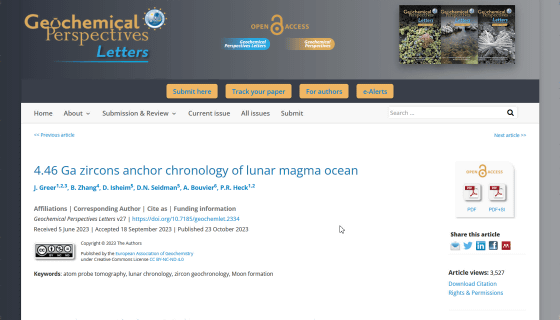Zircon crystals brought back by Apollo 17 reveal that the moon is about 40 million years older than previously thought

Several hypotheses have been proposed as to how the moon was formed, but the most likely one is that a planet called
4.46 Ga zircons anchor chronology of lunar magma ocean | Geochemical Perspectives Letters
https://www.geochemicalperspectivesletters.org/article2334/

The Moon Is 40 Million Years Older than Previously Thought | News | Northwestern Engineering
https://www.mccormick.northwestern.edu/news/articles/2023/10/the-moon-is-40-million-years-older-than-previously-thought/
Crystals brought back by astronauts show that | EurekAlert!
https://www.eurekalert.org/news-releases/1005078
Moon is 40 million years older than we thought, tiny crystals from Apollo mission confirm | Live Science
https://www.livescience.com/space/the-moon/moon-is-40-million-years-older-than-we-thought-tiny-crystals-from-apollo-mission-confirm
The Moon Is Millions of Years Older Than We Thought, Scientists Say : ScienceAlert
https://www.sciencealert.com/the-moon-is-millions-of-years-older-than-we-thought-scientists-say
The moon is thought to have been formed not long after the Earth was formed, and the giant impact theory suggests that it may have formed just a few hours after Theia's impact. A new research team from the Field Museum of Natural History and Northwestern University has investigated at least how many years ago the moon was formed by analyzing zircon crystals brought back from the moon by Apollo 17.
Zircon crystals are minute rocks formed by extremely high temperatures and strong pressure, and are used on Earth to measure the age of craters impacted by meteorites. It is believed that zircon crystals were created even after the moon was formed by the giant impact, but the surface of the moon was covered with magma hot enough to melt zircon immediately after its formation, so zircon crystals on the lunar surface Both were created after the moon's surface had cooled and solidified.
In addition, the outer layer of the zircon crystal contains the radioactive element uranium , and lead is also present, which is a result of the radioactive decay of this uranium. By measuring the ratio of uranium to lead, it is possible to determine when zircon crystals were formed.

Therefore, a research team led by space scientist Philip Heck of the Field Museum of Natural History will analyze zircon crystals brought back by Apollo 17 to determine at least how many years ago the moon existed. I did some research. 'When the moon's surface melted, zircon crystals could not form or persist, so zircon crystals on the moon must have formed after the moon's magma cooled,' Heck said. 'No, otherwise the zircon crystals would have melted and their chemical signature would have disappeared.'
The research team used specialized equipment at Northwestern University to analyze the zircon crystals using a method called
The image below is a photograph of a portion of a zircon crystal that was actually sharpened during atom probe tomography analysis.

Analysis revealed that the zircon crystals brought back by Apollo 17 were created 4.46 billion years ago based on the ratio of uranium to lead. In other words, the moon was formed at least 4.46 billion years ago.
In addition, a 2021 study also analyzed zircon crystals collected on the moon, and it was reported that the sample dates back up to 4.46 billion years ago, but the research team at that time had many problems with the dating method. It was pointed out that there is uncertainty. Therefore, the oldest zircon crystal that was more widely recognized was 4.42 billion years old, analyzed in a 2009 study .
Regarding the importance of knowing when the moon was formed, Mr. Heck said, ``The moon is an important partner in the planetary system. We owe things like ebbs and flows to the moon. Without the moon, life on Earth would be different. The moon is part of a natural system that we would like to understand more deeply. 'This study provides a small piece of the puzzle in that picture.'

Related Posts:
in Science, Posted by log1h_ik







